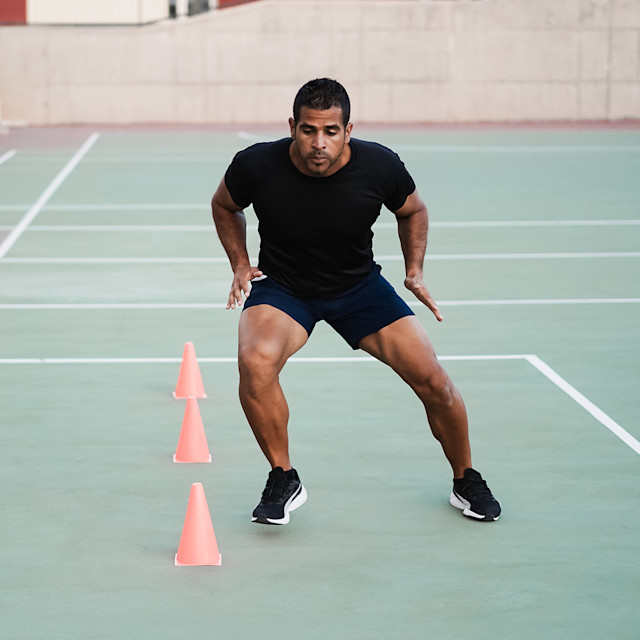Can you enhance your cognitive health through exercise? Science says yes.
There have been many studies in recent years that found direct correlations between exercise and positive improvements in our lives. We know that regular exercise helps us live longer and that running for 15 minutes daily reduces the risk of depression by 26 percent.
But a study released last year found that we can take it one step further: strategically moving our bodies to optimize specific parts of our mental well-being. Much like different forms of exercise benefit different elements of our physical health, science now tells us that they also improve different corners of our brains.
For the study, researchers split participants into different workout groups and then measured their cognitive skills as they performed various tasks. The researchers discovered that individuals who engaged in HIIT workouts performed better with spatial learning tasks (e.g., remembering the positions of shapes on a screen). In contrast, individuals who performed low-to-moderate cardio workouts, like walking and jogging, specifically improved their naturalistic recall (e.g., remembering a series of events).
“Just as strength training may be customized to target a specific muscle group…similar principles might also be applied to target specific improvements in cognitive fitness and mental health,” the researchers reported in their findings.
RELATED: Your Brain on Exercise
Does this mean we can tailor our workout routines to target the areas of our memory that we struggle with most?
Ella McCrystal, a psychotherapist/clinical hypnotherapist and director of The Northampton Clinic, a 93-year-old osteopathic clinic in the United Kingdom, says yes.
“Incorporating the science of exercise into one's fitness routine can yield long-term benefits for memory enhancement,” she says. “Engaging in regular physical activity stimulates the production of brain-derived neurotrophic factor (BDNF), a protein that promotes the growth of neurons and supports synaptic plasticity. This mechanism facilitates the formation and consolidation of memories, ultimately contributing to improved memory retention.”
“While HIIT workouts do improve our spatial learning, longevity depends on the health of our short- and long-term memory, including naturalistic recall.”
While HIIT workouts do improve our spatial learning, longevity depends on the health of our short- and long-term memory, including naturalistic recall.
Use Aerobic Activity to Improve Memory Retention
To take advantage of the science, McCrystal recommends that individuals incorporate more aerobic exercise, such as brisk walks, runs, or cycling, into their routines.
“Engaging in such activities for at least 150 minutes per week can promote the release of BDNF and trigger positive changes in brain structure and function, which directly impact memory capacity,” she says.
Why aerobic exercise specifically? While HIIT workouts do improve our spatial learning, longevity depends on the health of our short- and long-term memory, including naturalistic recall.
RELATED: The Power of Cognitive Restructuring
“Certain types of exercises, like cardiovascular exercises, have shown a stronger association with memory enhancement,” says McCrystal. “These exercises increase blood flow to the brain, delivering essential nutrients and oxygen for optimal cognitive function. Aerobic exercises also foster the release of neurotransmitters such as dopamine and serotonin, which play a role in mood regulation and memory consolidation.”
Diversify Your Routine to Target More Parts of Your Memory
But before you switch from weight room sessions to solely attending Precision Run classes, take note: You’ll also want to “blend your intensities” and exercise formats, says Edna Skopljak, M.D., a medical advisor for HealthReporter.
“Just as a combination of treatments addresses a medical condition, diversifying exercise intensity is key,” she says. “Different exercises stimulate varying brain regions, offering a comprehensive cognitive workout...Activities like dance not only challenge the body but also the mind. They require memory recall for steps, offering a dual benefit.”
Engaging in group activities like sports also stimulates our minds in unique ways. “Playing sports that involve strategy and coordination can further enhance memory function,” says McCrystal. “These activities engage various brain regions, fostering neuroplasticity, and promoting the creation of new neural connections.”
RELATED: The Memory Sense
Consistency is (Always) Key
Ultimately, both experts agree that regular exercise matters more than what types of exercise you do.
“Drawing parallels from long-term treatments, the brain thrives on regular, sustained activity,” says Dr. Skopljak. “Just as medications require consistent dosing to be effective, our cognitive health benefits from a steady exercise regimen.”
And exercise is just one part of the consistency equation.
“Maintaining and enhancing memory requires a holistic approach encompassing lifestyle factors beyond exercise,” says McCrystal. “Adequate sleep is essential for memory consolidation, as it allows the brain to organize and store information gathered throughout the day. A balanced diet rich in antioxidants, omega-3 fatty acids, and other nutrients supports brain health and cognitive function. Mindfulness practices, such as meditation and deep breathing exercises, can also contribute to memory improvement. These practices help reduce stress and enhance focus, which are critical components of memory formation and retrieval.”
Supplement Your Routine, Don’t Overhaul It
The final takeaway? Keep an eye on the science and use those discoveries however it makes sense in your life and routine.
“The evolving field of neuroscience has illuminated the profound impact of physical exercise on memory enhancement. As a psychotherapist, I recognize and apply the science behind exercise-related memory improvements as they can empower individuals to take control of their cognitive health,” McCrystal says. “As science continues to uncover the intricate connections between physical well-being and cognitive function, individuals can leverage these insights to optimize their mental prowess and lead more fulfilling lives.”
